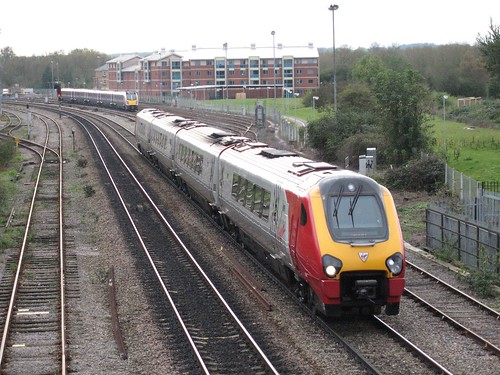Voyagers are a high speed diesel electric multiple unit train built by Bombardier and introduced in 2001 for Virgin Cross Country services. There are two varieties of Voyagers, class 220 and class 221, the latter having tilt capability. A further class of similar trains were built for the Midland main line and are called Meridians, designated class 222.
As originally built the class 220 units were four car and the class 221 made up into four and five car sets. The trains were originally intended for a high-intensity service centred around a hub at Birmingham New Street. This was known as Operation Princess but it proved unworkable, led to severe overcrowding on some sections, and was abandoned after a few months. After that, the Voyagers ran in pairs over the busier sections of route - an uneconomic arrangement as two sets of train crew are needed. It is also unlikely that this type of train would have been considered if the operation of eight car trains had been contemplated from the outset.
There have been many criticisms of Voyagers, mostly relating to passenger comfort. The seating capacity is low and the seating is cramped, luggage capacity is inadequate and engine vibration is intrusive. One reason for the low seating capacity is the space taken up by wheelchair access toilets, of which there are more than required by the regulations. They are also heavy; class 220 intermediate cars weigh 44 tons and class 221 52 tons, compared to 35 tons for a hauled mark 3 vehicle.
With the go-ahead having been given for additional electrification, it has been proposed that additional Voyager cars be built with pantographs, so that the trains can switch to electric power on electrified routes. This is in principle a similar concept to the Hitachi IEP train, with similar advantage of flexibility and the similar drawback that costly equipment is being carried around uselessly all the time.
What else could be done with these trains? There are 34 class 220s and 44 of class 221. That gives 156 driving cars and about 200 intermediate vehicles. What if the engines were removed and the cars used as hauled stock, the end vehicles becoming control trailers? They would then augment the fleet of hauled mark 3 stock and the trailer cars presently running within HST sets, all of which are now known to have a live expectancy of at least 60 years from their date of construction.
One of the benefits of this scheme is that the Voyager cars are compliant with accessibility requirements, which mark 3 stock is not, and combining vehicles of the two types would avoid the need for an expensive small build of accessible vehicles compatible with mark 3 stock. Such a scheme could provide Britain's railways with the ability to react flexibly to traffic requirements, something that is painfully lacking at the moment.
As originally built the class 220 units were four car and the class 221 made up into four and five car sets. The trains were originally intended for a high-intensity service centred around a hub at Birmingham New Street. This was known as Operation Princess but it proved unworkable, led to severe overcrowding on some sections, and was abandoned after a few months. After that, the Voyagers ran in pairs over the busier sections of route - an uneconomic arrangement as two sets of train crew are needed. It is also unlikely that this type of train would have been considered if the operation of eight car trains had been contemplated from the outset.
There have been many criticisms of Voyagers, mostly relating to passenger comfort. The seating capacity is low and the seating is cramped, luggage capacity is inadequate and engine vibration is intrusive. One reason for the low seating capacity is the space taken up by wheelchair access toilets, of which there are more than required by the regulations. They are also heavy; class 220 intermediate cars weigh 44 tons and class 221 52 tons, compared to 35 tons for a hauled mark 3 vehicle.
With the go-ahead having been given for additional electrification, it has been proposed that additional Voyager cars be built with pantographs, so that the trains can switch to electric power on electrified routes. This is in principle a similar concept to the Hitachi IEP train, with similar advantage of flexibility and the similar drawback that costly equipment is being carried around uselessly all the time.
What else could be done with these trains? There are 34 class 220s and 44 of class 221. That gives 156 driving cars and about 200 intermediate vehicles. What if the engines were removed and the cars used as hauled stock, the end vehicles becoming control trailers? They would then augment the fleet of hauled mark 3 stock and the trailer cars presently running within HST sets, all of which are now known to have a live expectancy of at least 60 years from their date of construction.
One of the benefits of this scheme is that the Voyager cars are compliant with accessibility requirements, which mark 3 stock is not, and combining vehicles of the two types would avoid the need for an expensive small build of accessible vehicles compatible with mark 3 stock. Such a scheme could provide Britain's railways with the ability to react flexibly to traffic requirements, something that is painfully lacking at the moment.

Kommentarer